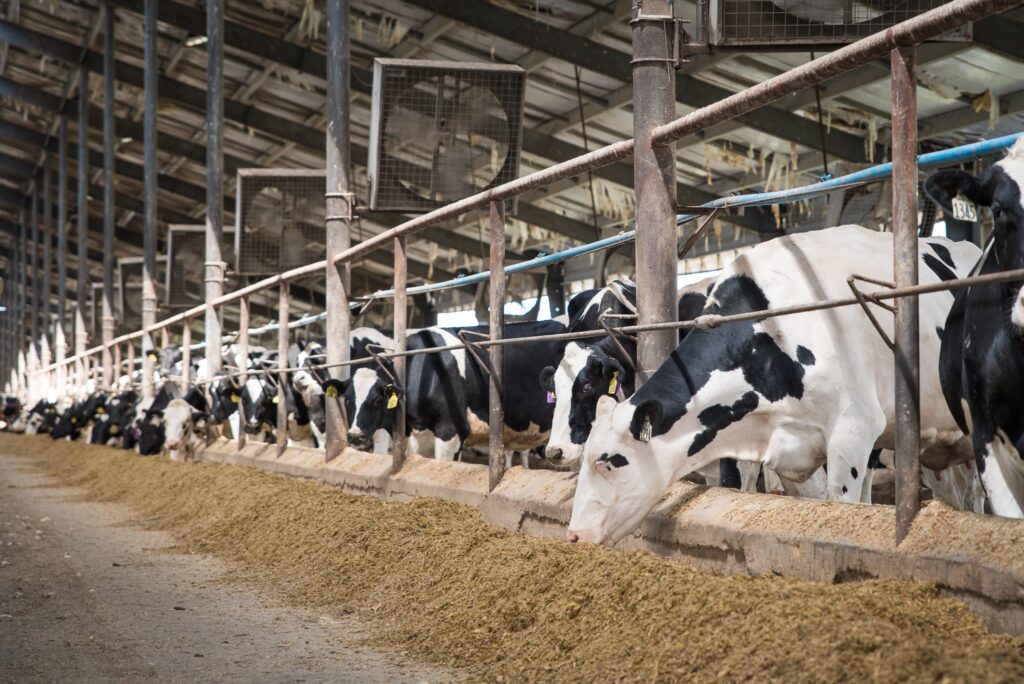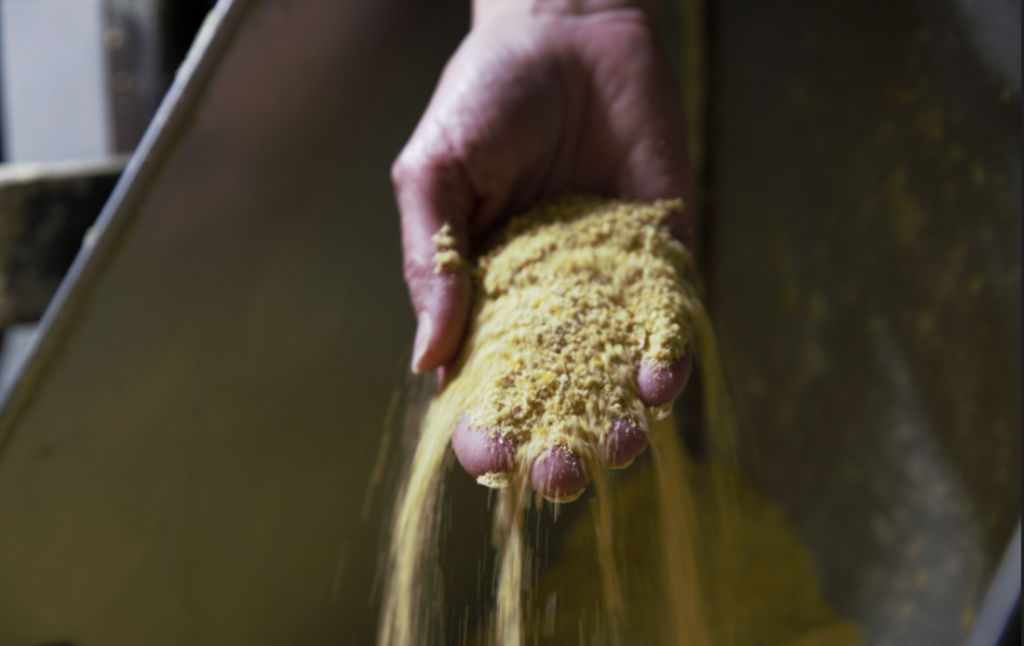Animal Nutrition
Nutrition is top of mind for most of us. We understand the benefits of eating a healthy, balanced diet and, more than ever before, rely on supplemental nutrition like vitamins, minerals, microbials (i.e., probiotics), herbal extracts, essential oils and other nutritionally supporting compounds to fill in the gaps where our diets may fall short, ensuring we stay healthy and productive.
 In animal agriculture, nutrition is also key to keeping animals healthy. Farmers and ranchers focus on providing balanced diets to their animals and supplementing where they can to ensure animals thrive. Providing livestock and poultry with high quality nutrition not only nourishes animals, but it also translates to safe, nutritious, sustainably produced food for families around the world.
In animal agriculture, nutrition is also key to keeping animals healthy. Farmers and ranchers focus on providing balanced diets to their animals and supplementing where they can to ensure animals thrive. Providing livestock and poultry with high quality nutrition not only nourishes animals, but it also translates to safe, nutritious, sustainably produced food for families around the world.
Science-Based Diets
From the day a farm animal is born, its diet is tailored to each stage of its life. Nutritional needs of a newborn animal are very different from those that are fully grown. You certainly wouldn’t feed a puppy the same thing you would a mature dog – and the same is true for farm animals. Farmers and ranchers work with and rely on the advice of nutritionists and independent experts to develop science-based diets for the right balance of nutrients that vary depending on the species, age and productive status of the animal. Extensive research goes into animal feed formulations (sometimes called “rations”) to create balanced diets that meet important nutrient requirements.
 For example, young calves rely on milk for a significant source of nutrients. Many beef cattle then transition to grass. Some cattle remain grass-fed, meaning they only eat grass and forage (plants or parts of plants) for their entire lifetime. To qualify as “grass-fed,” the animals cannot be fed any grains or grain by-products. As they get older, most beef cattle transition to a specially formulated ration including corn, soybeans and other grains. Meat from these animals is referred to as “grain-fed.” In comparison, a dairy cow’s diet typically consists of pasture grass or chopped, fermented grass or corn stalks (silage) and grains like corn and soybean meal. Corn and soybeans are primary ingredients in the diets of chickens and pigs.
For example, young calves rely on milk for a significant source of nutrients. Many beef cattle then transition to grass. Some cattle remain grass-fed, meaning they only eat grass and forage (plants or parts of plants) for their entire lifetime. To qualify as “grass-fed,” the animals cannot be fed any grains or grain by-products. As they get older, most beef cattle transition to a specially formulated ration including corn, soybeans and other grains. Meat from these animals is referred to as “grain-fed.” In comparison, a dairy cow’s diet typically consists of pasture grass or chopped, fermented grass or corn stalks (silage) and grains like corn and soybean meal. Corn and soybeans are primary ingredients in the diets of chickens and pigs.
But there is a lot more to it. Animal diets are sophisticated and well-balanced to optimize animal health, which also translates into animal productivity, which helps decrease environmental impact.
Generally speaking, there are six classes of nutrients for livestock: proteins and amino acids, carbohydrates, fats, minerals, vitamins and water. Each nutrient is provided at levels to ensure optimal health and performance, playing a unique and very important role in a balanced diet. Sources of these nutrients include soybean meal as a source of proteins and amino acids and corn as a source of carbohydrates and energy. Fats provide energy, too, and have been shown to provide benefits to reproduction. Minerals such as calcium, phosphorous, magnesium, zinc and iron, and vitamins provide for overall health while also supporting metabolism. And, of course, water is vital to survival and many internal processes. While water makes up approximately 50 to 70 percent of adult body mass, water is 90 percent of the body mass of newborn animals.
Nutritional Products
Like many of us taking nutritional supplements such as probiotics to improve our health, animals are fed nutritional products, too. These nutritional products are commonly referred to as nutritional specialty products, and they make a real difference in providing optimal nutrition and health to the animal.
Studies show they help support animal immune systems and improve overall intestinal health. As a bonus, many of these products are all natural and made from renewable sources like quillaja trees.
Researchers continually work to discover new nutritional specialty products. Finding the right product can help reduce susceptibility to illness, and therefore the need for medicines like antibiotics, while also minimizing the animal’s consumption of natural resources. How? When an animal is healthy and its digestive tract and immune system are functioning properly, it grows and eats efficiently, unlike sick animals. Nutritional specialty products play an important part in the evolution of animal agriculture, which is powered by research and development.
Nutrition and Sustainability
Ensuring animal health through proper nutrition results in a healthier planet, too. When animals don’t receive proper nutrition, they become unthrifty and can suffer from illness. Farmers have the responsibility to be good stewards of all animals in their care – including their beloved pets and animals raised for food. Animal nutritionists and veterinarians work together as a team with farmers to ensure animals are well-cared for.
Healthy animals contribute to healthy lives for people around the world. In lower income countries, livestock provide a source of food, income and an opportunity for education for their families. Unhealthy animals would especially impact the family’s health and the health of local economies. More than one billion people worldwide earn a living raising and selling livestock, while billions more depend on the protein and nutrients provided by animal-sourced foods.
The reality is farmers and ranchers with healthy animals produce more food and use less feed, water, land and medicines (fewer resources). Thanks to a balanced diet tailored to meet the specific nutrient requirements of the animal, farm animals are healthier and more productive than ever before and that’s good for people, animals and the environment.
Sustainable Feed
Livestock and poultry are grown more sustainably than ever before and so are the feedstuffs that nourish them. The original stewards of the land, farmers, have always worked to protect the land, air and water in order to grow and raise healthy food and keep the family tradition of farming alive.
Crop farmers who grow important livestock grains like corn and soybeans continually look to innovation, incorporating new technologies and practices that keep rich nutrients in the soil. In addition, many use GPS satellite guidance that helps them specifically apply crop protection products and water only where needed, drones that help them scout areas of the field that may need extra attention, and genetically modified and gene-edited seed that can better resist drought, pests and diseases.
It’s through important advances in animal nutrition and management that farmers employ in the daily care of their animals that will continue to build on the knowledge of those before them to enhance animal health, while providing safe, nutritious food and protecting our planet.